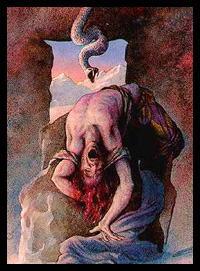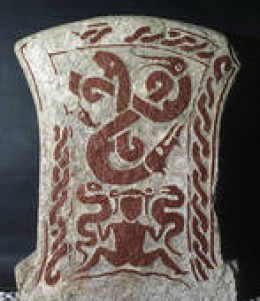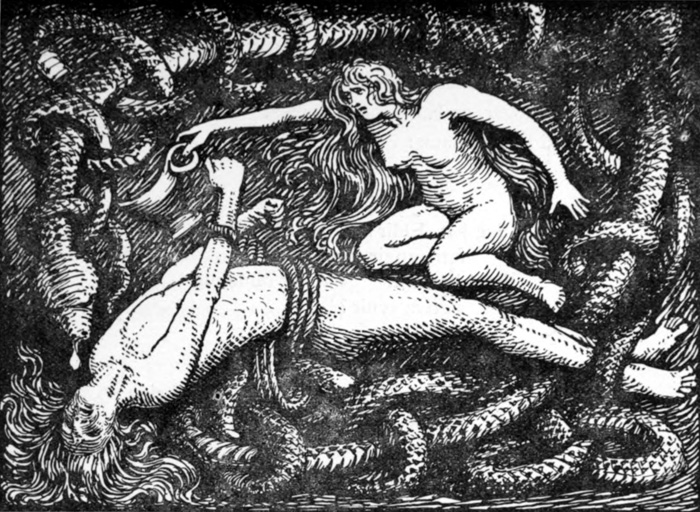 Loki knew that his days in Asgard had come to an end. He knew how soon anguish can give way to anger and was sure the gods would avenge Balder’s death and detention in Hel.
Loki knew that his days in Asgard had come to an end. He knew how soon anguish can give way to anger and was sure the gods would avenge Balder’s death and detention in Hel.
He ran away. He made for a deserted part of Midgard, a remote place in the mountains at the head of a steep valley that fell into the sea. He found a hollow near Franang’s Falls and, using the rock and rubble lying all around, built a low house that no man was likely to see until he had stumbled into it. It had four doors so that Loki could keep watch in every direction.
Even so, he felt unsafe. When a gull circled and shrieked, or scree shifted on the mountain, or wind whistled in his walls, the Trickster leaped up in alarm, certain he had been tracked down. It did not matter that days passed without a single visitor, Loki’s anxiety grew greater day by day; he could not escape his own canker.
He thought he might be better off if he were out of the house and in disguise. At dawn the Shape Changer often turned himself into a salmon and leaped into the seething cauldron at the base of Franang’s Falls. The cross currents whirled around him, the thunder roared above him; still the salmon felt unsafe.
In Loki’s mind it was not a question of whether but of when the gods would catch up with him. But fearful as he was, hunted and in hiding, he was more fearful of vengeance, and vowed to remain at large for as long as he had the wits to do so.
Early one evening, Loki sat beside his fire and began to play with some lengths of linen twine. He arranged them and rearranged them; he laid them out across each other and tied them and made them into a net with so fine a mesh that not even a small fish could hope to slip through it. For a long time he stared at his fine device.
Suddenly he heard the sound of voices down in the valley; he saw a group of gods making their way towards him. Loki jumped up, threw the net into the fire and hurried out of the door overlooking Franang’s Falls. He ran down the slope, turned himself into a salmon once more and slid into the boiling icy water.
There was nothing that escaped Odin’s eye when he sat in Hlidskhalf. He saw the comings and goings of every living creature in the nine worlds; and when he saw Loki’s efforts to escape his fate, he sent a party of gods from Asgard to capture him.
The first to step across the threshold of Loki’s house was Kvasir, the wisest of them all. In the half light, he peered around without a word. He looked at the rough table and bench, the bare walls, the almost lifeless fire. Kvasir bent down and stared at the pattern of gleaming white ash; he carefully examined it and understood what he saw. “This,” he said to his companions, “is some device for catching fish. Let us catch a fish.”
The gods sat down in Loki’s house and gave over the rest of the evening to making a wide net with which to drag the pool at the base of the Falls and the river that hurried down the valley to the sea. They copied the subtle pattern Kvasir had found in the embers and, before they slept, they had finished their work and were well content with it.
At dawn the gods walked down under Franang’s Falls. The roar of water slamming against water was deafening. The air was misty with whirling and drifting spray; the gods stared around them and the whole world looked oyster and ivory and grey. Then Thor took one end of the net and, motioning to the others to stay where they were, waded across the water. So the gods began to drag the river and the salmon swam downstream in front of them. After a time, wily Loki found a safe place where the water sluiced between two slimy boulders and he nestled there so that the net only scraped his back and did not snare him. When the gods brought up the net, there was nothing in it. They were all sure, though, that they had felt something alive in the water. They decided to try again, and this time they used stones to weight the bottom of the drag-net so that nothing could swim under it.
Now, the gods made their way back to the base of Franang’s Falls – Thor on one side and all the rest on the other – and dropped the net into the water. Once more Loki swam ahead of them as they dragged the river, but this time there was no safety on the river bed. He had no choice but to hurry on downstream. When Loki saw that the gods meant to drag the tumbling river right down to the shallows where it opened on to the sea, he turned round to face the net. He arched his back, and with all his strength, sprang into the air and right over it.
The gods shouted and pointed at the salmon shining in the sunlight. They hurried back up to Franang’s Falls and there they argued about how to catch it. Each god had his own idea but, in the end, they bowed to Kvasir: he said they should split into two groups – one on either bank – all except Thor who was to wade in midstream just behind the net.
Now the gods began to drag the river for a third time. As before, Loki swam downstream some way in front of them. He knew that only two choices were open to him: to squirm and jump across the long stretch of shallows into the sea or to turn and leap over the drag-net again. He thought the gods might catch him before he reached the safety of deep water and so he turned, arched his back into a rainbow, and sprang into the air. The salmon flashed in the sunlight and jumped clear of the net.
Then Thor groped and clutched at it and the salmon slithered through his hands. Thor held on and tightened his grip; he squeezed and stayed the slippery salmon by its tail. It writhed and it twisted but it could not escape. Loki was caught at last and he knew it.
After Balder’s death, not one of the gods would stain Gladsheim by spilling Loki’s blood. But there was nothing holy about the barren ground of Midgard, and they were all eager to take vengeance on him.
While Thor and one group of gods led Loki into a twilit cave, a dismal cavern belonging to bats and ticking with the drips of water from stalactites, the other party went off in pursuit of Loki’s two sons, Vali and Narvi. They changed Vali into a wolf and at once he leaped at his brother and sunk his teeth into his throat. He ripped Narvi’s body apart before bounding away, howling, toward Jotunheim.
The gods took over where Vali had left off. They drew out Narvi’s entrails and made their way to the cave. Loki’s faithful wife, Sigyn, went with them, sorrowing over the fate of her two sons, the fate of her husband.
 Loki was thrown to the ground. He lay still; he looked at nobody and said nothing. Then the gods took three slabs of rock, stood them on end and bored a hole through each of them. They stretched Loki over them, unwound Narvi’s entrails and bound him with the gut of his own son as no one had ever been bound before. They trussed Loki’s shoulders to one slab, twisting the gut round his body under his armpits; they strapped Loki’s loins to one slab, winding the gut round and round his hips; they clamped Loki’s kneecaps to one slab, tying the gut round his legs. And no sooner was Loki bound than the entrails of his son became as hard as iron.
Loki was thrown to the ground. He lay still; he looked at nobody and said nothing. Then the gods took three slabs of rock, stood them on end and bored a hole through each of them. They stretched Loki over them, unwound Narvi’s entrails and bound him with the gut of his own son as no one had ever been bound before. They trussed Loki’s shoulders to one slab, twisting the gut round his body under his armpits; they strapped Loki’s loins to one slab, winding the gut round and round his hips; they clamped Loki’s kneecaps to one slab, tying the gut round his legs. And no sooner was Loki bound than the entrails of his son became as hard as iron.
Then Skadi carried a vile snake into the cave. She fastened it to a stalactite high up in the darkness so that its venom would drip straight on to Loki’s face. For all his wiles and wit, there was nothing Loki could do. He lay still; he looked at nobody and said nothing. Then the gods left Loki there; no longer flushed but heavy-hearted and sorrowing they left him to his fate, and to faithful Sigyn.
Sigyn and Loki wait in the damp twilit cave, listening to the eerie echoes of each drip, the sound of the silence, the sound of their own breathing. Sigyn holds a wooden bowl over Loki’s face and slowly it fills with the snake’s venom. When it is brimming, Sigyn carries the bowl away and empties it into a rock basin – a fermenting pool of poison.
Loki is left unguarded; he screws up his eyes. The snake does not wait. Its venom splashes on to Loki’s face and in torment he shudders and writhes. He cannot escape and the whole earth quakes.
Loki lies bound. That is how things are and how things will remain until Ragnarok.


sayler
My god that’s a gross story. I feel so sorry for Sigyn. Like what did Narvi and vali do to deserve that fate? Sigyn? It’s Loki’s fault yet others are punished for his sins.
clari
My question is why was Skadi angry at Loki. All the other gods had a reason, accept her.
Od
Well, you see, Skadi was in love with Baldur, and never forgave Loki for killing him. She wanted a special kind of vengeance to mirror her unending torment.
SonofFrigg
Loki admitted to being there and helping the gods kill Thjassi her father.
Lokasenna 50-41
Raj Ali
If Loki hadn’t agreed to lure Idunn out of Asgard for Thiassi, Skadi’s father, the latter would not have died in the hands of the gods.
Although Thiassi is at fault, Skadi might still have some anger burning within her.
After her marriage to Njord, she was still upset. There was a bet that no one could make her laugh. Loki succeeded by prancing around playing tug-of-war with a goat tied to his (pardon me) scrotum. Skadi laughed.